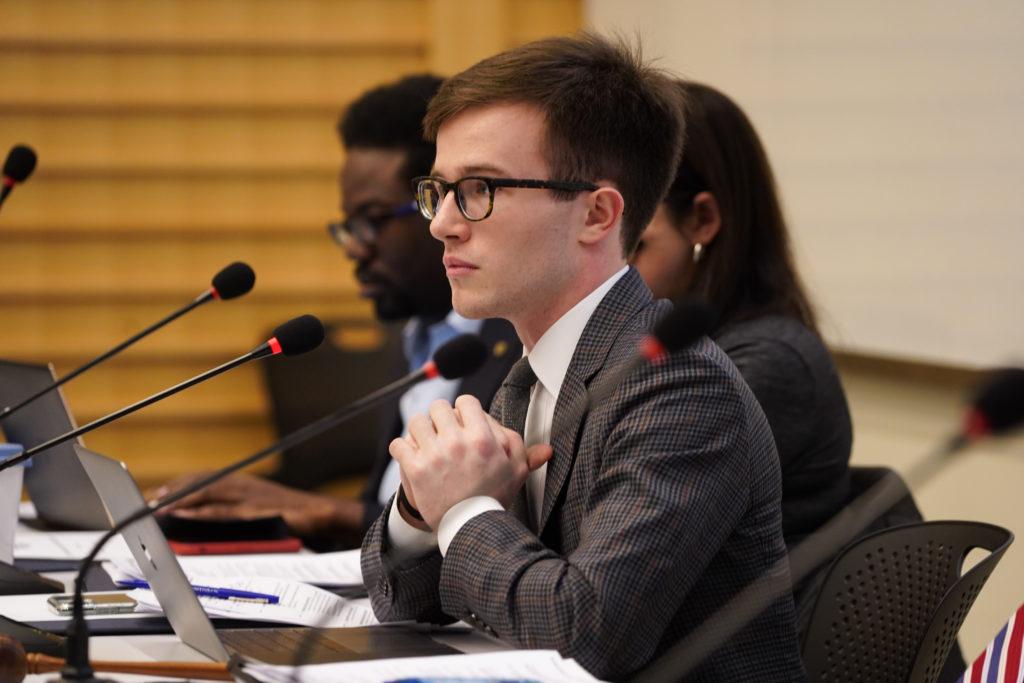Updated: Feb. 21, 2020 at 12:46 p.m.
A local governing body passed a resolution commending proposed changes to the annual Metro budget at a monthly meeting Wednesday.
Foggy Bottom and West End Advisory Neighborhood Commissioners unanimously approved a resolution supporting initiatives proposed in Washington Metropolitan Area Transit Authority’s 2021 budget, like eliminating transfer fees or extending operating hours. Commissioners heard reports from various local entities, like representatives from the GW Hospital, who presented an update on the hospital helipad, and a liaison from Mayor Muriel Bowser’s office, who discussed homeless encampments city officials recently cleared.
Here are the highlights from the meeting:
Changes to WMATA budget proposal
ANC chair Patrick Kennedy introduced a resolution supporting initiatives WMATA is considering for its fiscal year 2021 budget, like adding flat-rate weekend fares, restoring late night and early morning hours and eliminating transfer.
The Metro currently closes at 11:30 p.m. on weekdays and 1 a.m. on weekends, according to the WMATA website. Riders have to pay full price for each ride if they transfer outside of a two-hour period, and Metro offers a 50 cent discount when transferring between Metrorail and Metrobus, according to WMATA’s website.
Kennedy said eliminating the transfer fee would cut down on total transportation costs for residents.
“I think it opens up a lot of opportunities for the system, and it’s an equity booster as well for the people who would otherwise take a series of bus trips, rather than transferring to a quicker train, just to avoid their commute costing twice as much,” Kennedy said.
Commissioner James Harnett, a senior and the ANC’s vice chair, said he and Kennedy plan to attend a WMATA budget hearing, scheduled for next Wednesday, to advocate for the changes. Harnett introduced an amendment to Kennedy’s resolution, adding language backing a Metro pass program for students.
Students have pushed for a Metro pass for years, but officials have continuously rejected the idea, stating that the pass would be too expensive.
“Two years ago former Commissioner Zhurbinskiy, who used to occupy the seat that I now do, fought for this and was able to move the ball forward,” Harnett said. “I’m confident this year we’ll be able to get all the way there.”
GW Hospital helipad update
Babak Sarani, M.D., the GW Hospital’s trauma and acute care surgery director, and hospital spokeswoman Christine Searight updated community members on how the hospital’s helipad has been operating.
The ANC, D.C. Council and Bowser approved the helipad throughout 2018, leading to the platform’s eventual construction and unveiling last year.
Sarani said the helipad has been used about two to three times per week since opening in November, totaling 43 separate uses – including once to fly a man with multiple gunshot wounds to the hospital from United Medical Center.
“He is fully expected to recover, and he is fully alive in the hospital right now,” he said.
Sarani said transporting patients on the ground is safer and cheaper for patients, and using the helicopter is typically a last resort.
“I am cognizant of the charges that I’m generating for those patients, many of whom are underprivileged,” Sarani said. “We only fly when we absolutely have to. I mean that sincerely.”
Commissioner Evelyn Hudson, who joined the ANC in November, praised the helipad initiative and said that some Ward 2 residents don’t mind the air traffic.
“I’m from New York City, and I live in the area of Brooklyn, and I would say that GW Hospital care is comparable to South Side Mount Sinai, which is No. 1 in the country, to my knowledge,” Hudson said. “I have a medical issue in my own family, personally, and George Washington University has kept my child alive since 2003.”
Ward 2 homeless encampments
Nicole Goines, the Ward 2 liaison for Bowser’s office, said city officials recently cleared the area underneath the K Street underpass, part of the Vern Express’ route. Goines fielded questions from the audience about how the office cleans up homeless encampments and why many people experiencing homelessness return to the same area after clearing efforts conclude.
“We are constantly making sure that these areas do not serve a public health and safety risk,” Collins said.
This post has been updated to correct the following:
The Hatchet incorrectly reported that Anne Banner presented about the GW Hospital helipad. Christine Searight, a hospital spokeswoman, presented about the helipad. We regret this error. This post has also been updated to clarify language about the resolution advocating for changes proposed to WMATA’s budget.





